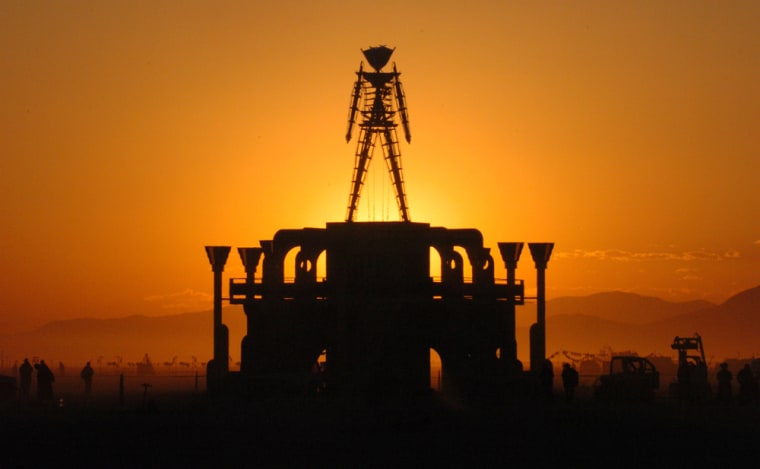There's trouble in the desert.
A co-founder of Burning Man, the annual six-day festival of self-expression that culminates in the torching of a 40-foot effigy on the salt flats of northern Nevada, has sued his ex-partners to strip them of ownership of the event's name and logo and to place the rights to their trademarks in the public domain.
John Law, who helped transform a series of small bonfire parties on a San Francisco beach into a phenomenon that drew more than 39,000 last year, sued Burning Man board members Larry Harvey and Michael Mikel in federal court Tuesday.
Harvey and Mikel have both recently tried to claim sole ownership over Burning Man's trademarks, violating an agreement the three signed after Law split with the organization in 1996, Law alleged.
"I decided to fight to keep anyone from having an exclusive right to capitalize on these brands," Law wrote on his blog. "Burning Man belongs to everyone."
Law's suit also seeks unspecified damages.
Both Harvey and Mikel were "surprised and disappointed" by the suit, said Marian Goodell, a spokeswoman for the corporation that runs Burning Man.
The pair have agreed to go into arbitration in their own dispute over the rights to Burning Man's trademarks, Goodell said. "They're working to get these issues resolved in a reasonable manner," she said.
Burners engaged in emotional debate
The announcement of the lawsuit on San Francisco culture blog Laughing Squid quickly spread across the Internet, spawning emotional debate among Burners, the self-given nickname of Burning Man participants.
Some supported Law's suit as a return to the ideals on which Burning Man was founded. Organizers bill it as "an annual experiment in temporary community dedicated to radical self-expression and radical self-reliance."
Money is eschewed at the event in favor of a "gift economy," but recent ticket prices _ $195 to $280 for Burning Man 2007 — have stirred complaints.
But many Burners worried that putting the Burning Man name in the public domain would result in an avalanche of commercial exploitation, from Burning Man-branded cigarette lighters to Burning Man sneakers made by multinational corporations.
Burning Man organizers have worked rigorously over the past decade to protect the event's name and what it stands for, turning down offers of corporate sponsorship and use of Burning Man images in advertising, Goodell said.
"It's kind of hard to imagine that the principles of Burning Man would remain intact if the name was in the public domain," Goodell said.
But Law argued on his blog that Burning Man participants would see through any attempt to use its name for commercial purposes.
"Those who really are part of it and support it will never mistake the event, and their involvement in it, with 'Burning Man condoms' or 'Burning Man antacid tablets,'" Law wrote.
